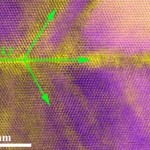 Most people see defects as flaws. A few Michigan Technological University researchers, however, see them as opportunities. Twin boundaries — which are small, symmetrical defects in materials — may present an opportunity to improve lithium-ion batteries. The twin boundary defects act as energy highways and could help get better performance out of the batteries. This finding, published in Nano Letters earlier this year, turns a previously held notion of material defects on its head. Reza Shahbazian–Yassar helped lead the study and holds a joint appointment at Michigan Tech as the Richard & Elizabeth Henes associate professor in nanotechnology and an adjunct associate professor in materials science and engineering. Anmin Nie, a senior postdoctoral researcher in his group, conducted the study.
Most people see defects as flaws. A few Michigan Technological University researchers, however, see them as opportunities. Twin boundaries — which are small, symmetrical defects in materials — may present an opportunity to improve lithium-ion batteries. The twin boundary defects act as energy highways and could help get better performance out of the batteries. This finding, published in Nano Letters earlier this year, turns a previously held notion of material defects on its head. Reza Shahbazian–Yassar helped lead the study and holds a joint appointment at Michigan Tech as the Richard & Elizabeth Henes associate professor in nanotechnology and an adjunct associate professor in materials science and engineering. Anmin Nie, a senior postdoctoral researcher in his group, conducted the study.
Read More